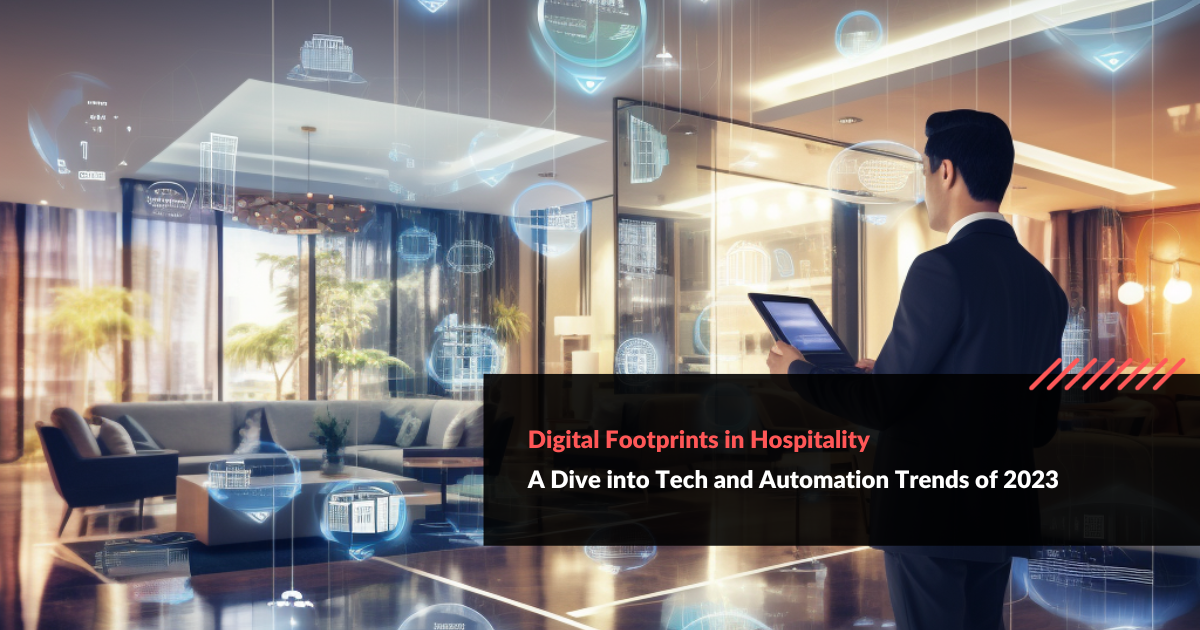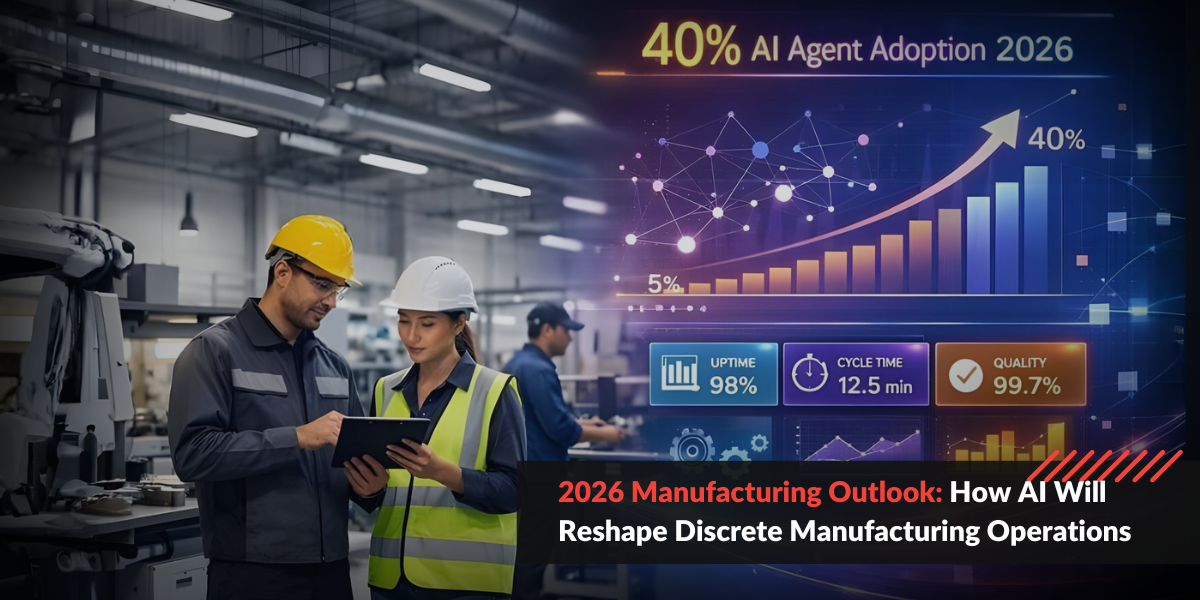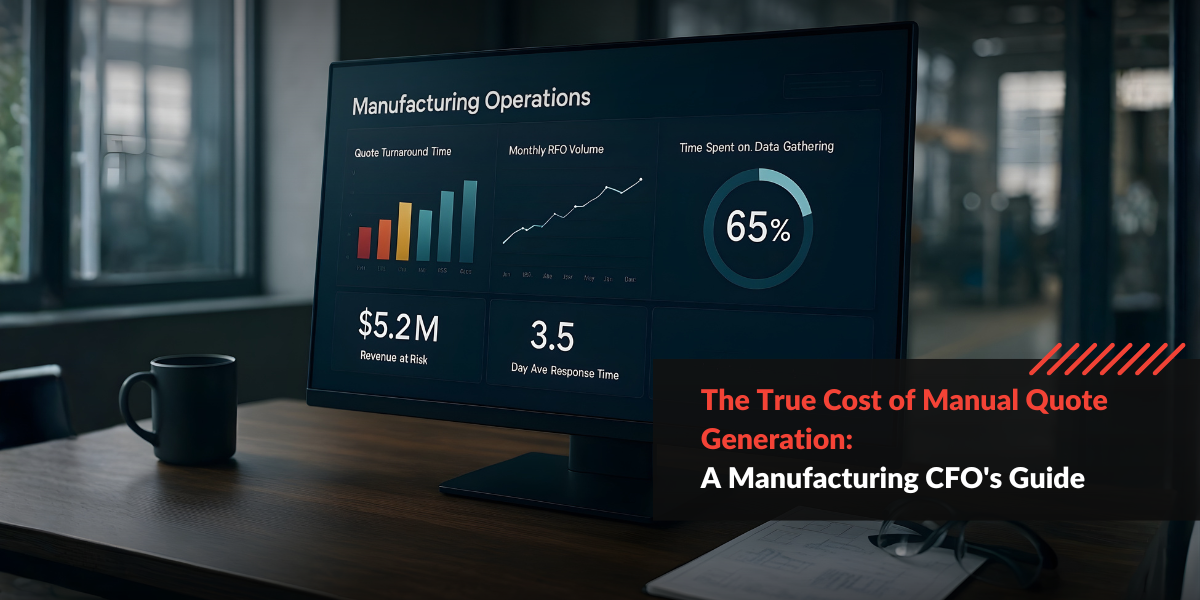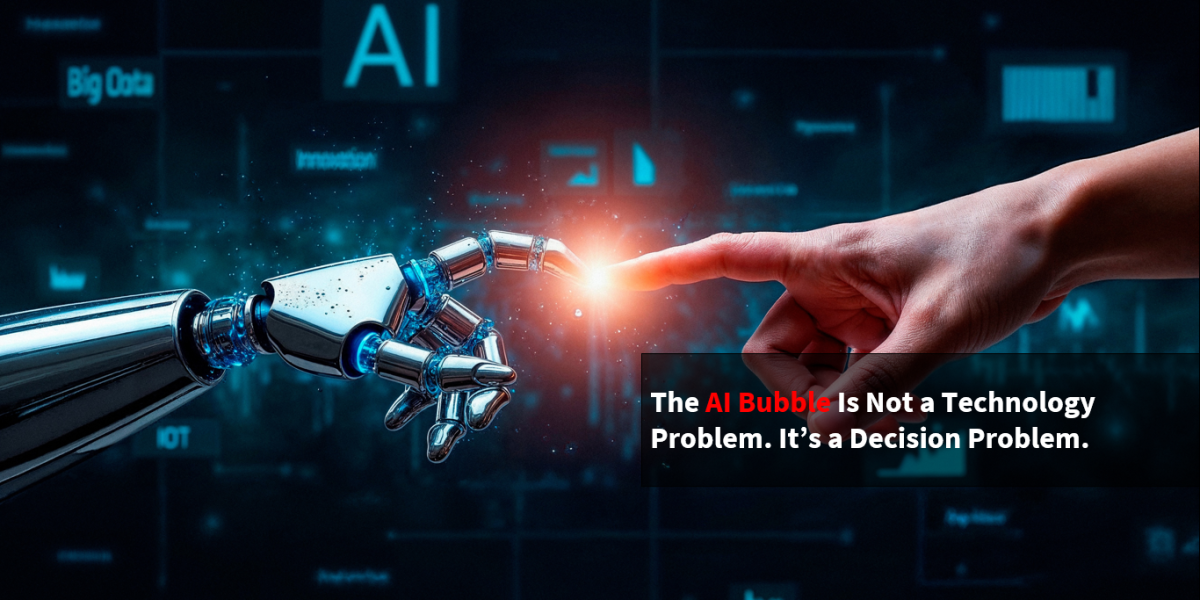Introduction
As we navigate through 2023, a significant storyline unfolds within the hospitality industry—the widespread adoption of technology and Automation. This year marked a pivotal phase where digital tools became integral cast members in the hospitality saga.
Now, as the year edges towards its close, it’s the perfect moment to pause and take stock—how has the hospitality sector adapted to these digital enhancements? This leads us to the notion of ‘Digital Footprints,’ a way to explore and comprehend the influence of tech trends in the hospitality landscape.
The journey of 2023 wasn’t just about introducing smart, automated systems. It was about evaluating how these systems meshed with the age-old ethos of hospitality, enhancing the guest experience while retaining the personal touch that defines this industry.
In comparison to other sectors like technology and retail, the hospitality industry’s market performance has been exceptional, with the gap widening in the second half of the year. Revenue per available room (RevPAR) in the industry has exceeded GDP growth during the current economic cycle hinting at a strong performance and a positive impact of technology and Automation.
We’re not just looking at the score of tech adoption; we’re exploring the narrative of technology and hospitality blending in 2023, understanding the rhythm of this partnership.
What were the Digital Trends of 2023
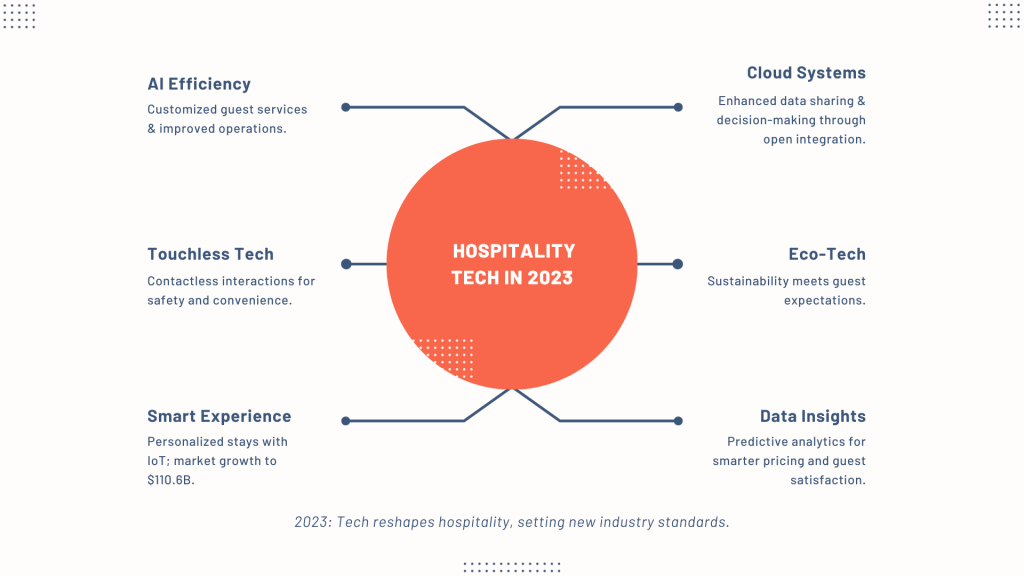
1. AI-enabled Automation
As 2023 unfolded, the hospitality industry experienced a digital renaissance, with AI and Automation leading the charge. Establishments across the globe embraced AI to improve service quality and operational efficiency. This wasn’t just about streamlining reservations or providing smart room services; it was about revolutionizing the entire guest journey with a layer of intelligent personalization.
A pivotal transition noted by Forbes was AI’s shift from an innovative experiment to an operational staple in the hospitality sector. AI-driven systems have delved into the depth of data, discerning guest preferences and reshaping service delivery. For example, a particular resort’s embrace of AI to streamline document processing operations led to a remarkable decrease in front desk workload and a corresponding surge in guest satisfaction—a testament to the transformative power of AI.
This capacity of AI to dissect and leverage big data has been transformative, fostering unprecedented personalization. It’s empowered establishments to extend bespoke services and experiences that once seemed unattainable. Operationally, AI has emerged as a strategic ally, pinpointing efficiency gaps and bolstering decision-making, thereby enhancing overall business performance.
In this landscape of innovation, for instance, our platform has been a powerful force, embodying an AI-first ethos. By automating the mundane, our technology liberated several hospitality teams to dedicate their expertise to what truly matters—crafting unforgettable guest experiences.
This harmonious blend of AI and human insight has not only streamlined operations but also enriched the guest experience, reinforcing the notion that in 2023, embracing AI was not just strategic but essential for forward-thinking hospitality businesses.
2. The Touchless Revolution
The echo of the pandemic continues to resonate in the operational rhythms of the hospitality sector. A bright spot in this narrative has been the advent of touchless technologies. Events such as the Hotel Show and Leisure Show in Dubai have highlighted how important touchless technologies are becoming.
Driven by an impetus for heightened hygiene and safety, these innovations are minimizing physical contact and improving the guest experience by giving them the experience of ‘the new normal.’ From contactless check-ins to digital room keys, the hospitality realm is embracing these changes, marking 2023 as a hallmark year for such digital leaps.
3. Smart Guest Experiences
The year 2023 has seen hospitality embracing smart technologies to offer a more personalized, seamless experience to guests. It’s about mobile check-ins reducing front desk waiting times, keyless entries via smartphones enhancing security, and IoT-based room controls tailoring the room ambience to each guest’s preference and more.
Smart hospitality isn’t just a fancy term; it’s a response to evolving guest expectations. New-age travelers are aware of their responsibility towards the environment and also expect the hospitality industry to adhere to the latest ESG standards. To meet these expectations, tools like automated lighting and climate control systems are reducing energy consumption, while smart waste management systems have to be implemented to meet broader sustainability goals.
The impact? Enormous. The smart hospitality market is on a trajectory to cross a whopping USD 110.6 billion by 2030.
Imagine a scenario where a guest can use their smartphone to not only check-in and unlock their room but also control in-room amenities and order room service. This level of convenience minimizes physical contact—a feature highly valued in the post-pandemic world— and significantly enhances the guest experience.
Moreover, the integration of mobile apps in hospitality is a game-changer. It’s not just about a one-time interaction but fostering a long-term relationship with guests. Personalized services ensure not just satisfaction but loyalty, encouraging repeat business.
The smart hospitality narrative is about creating a win-win, where operational efficiencies meet guest satisfaction, propelling the hospitality sector into a new era of innovation and guest-centric service.
Discover how Cognitive Hospitality leverages AI and automation to transform hospitality management and enhance guest experiences.
4. Cloud and Collaborative Platform
By adopting cloud and collaborative platforms, hotels and other hospitality entities are transforming their operations from the ground up.
The movement to cloud technology isn’t just a fleeting trend but a substantial shift toward creating a more collaborative and efficient operational ecosystem.
One of the remarkable aspects of this transition is the facilitation of open integration. As highlighted in a Forbes article, the concept of “Open Hospitality” emphasizes breaking free from the traditional siloed operations. With cloud platforms, data sharing has become a breeze, enabling real-time insights which are crucial for leadership to make informed operational decisions.
This open integration is not just about enhancing operational efficiency; it’s about setting a foundation for easy and continuous innovation and improvement. The cloud is playing a pivotal role in managing the vast amount of data generated daily, translating this data into actionable insights that drive better service delivery and guest satisfaction. It ensures data security and compliance, which are paramount in building and maintaining guest trust.
5. Sustainability Through Technology
The quest for sustainability has driven the adoption of eco-friendly technologies. Implementations like digital twins for meticulous planning, low-flow showerheads, and electric vehicle charging stations are steps towards a greener hospitality sector. This trend is not only appealing to the emerging segment of eco-conscious guests but is also a stride towards a better future.
6. Predictive Analytics for Personalization
In the hospitality sector, seasonal fluctuations can be a significant challenge. However, predictive analytics is providing a much-needed buffer. By delving into past data, it equips hotels and restaurants with foresight into room bookings, dining trends, and event demands, even during peak and off-peak times. This not only allows establishments to set optimal prices but also to manage staffing needs and adjust service offerings accordingly.
For business leaders, understanding these patterns and proactively adapting means fewer surprises and better resource allocation. In an industry as cyclical as hospitality, predictive analytics serves as a compass, pointing establishments toward stability amidst inherent unpredictability. It guides strategic decisions, ensuring resources are used efficiently, and guests are consistently satisfied.
A discourse by Kipsu elaborates on the proactive nature of predictive analytics, emphasizing its role in leveraging past guest interactions to enrich future visits. This goes beyond mere reaction to guest preferences, venturing into a realm of anticipatory engagement that makes each visit more memorable than the last.
On a parallel note, the application of Artificial Intelligence (AI) in predictive modelling significantly bolsters hotel revenue management. By scrutinizing historical data, AI-powered tools assist in forecasting demand and revenue, thereby optimizing pricing and availability to maximize revenue.
The dynamic pricing model, adjusted based on real-time demand, occupancy, and other factors, not only enhances revenue but also augments the guest experience by ensuring value for money.
This blend of technology is not merely a trend of 2023 but a cornerstone for the future of hospitality, laying the groundwork for an era where data-driven insights steer the course of action, ensuring a win-win scenario for both establishments and their guests.
These advancements echo broader shifts across industries. For example, in finance departments, manual accounting processes are proving to be major productivity drains, sparking a widespread push toward intelligent automation to eliminate bottlenecks and errors.
The Ripple Effect: Impact on Service and Guest Experience
The fusion of technology into the hospitality industry has not only redefined service delivery but also significantly enriched the guest experience. This section unveils the ripple effect of the digital trends discussed earlier, highlighting their impact on operational efficiency, guest satisfaction, and the overall hospitality landscape.

1. Enhanced Operational Efficiency
With AI-enabled automation tools stepping in, routine tasks are handled swiftly, freeing up staff to focus on more personalized guest interactions. Moreover, predictive analytics and cloud-based platforms have streamlined operational processes, reducing the time and resources required for planning and decision-making.
AI-enabled automation tools have transformed how routine tasks are managed, resulting in a significant shift of staff focus toward enhancing guest interactions.
For instance, a Dallas-based hospitality group deployed an Automated Payout Reconciliation system with RAP’s hyperautomation platform across its 100+ properties. This move automated the tedious process of extracting data for payout reconciliations from multiple systems, which was previously a manual and error-prone task. The Automation also enabled 100% efficiency and accuracy in extracting data from different sources.
2. Elevated Guest Satisfaction
The seamless and personalized experiences afforded by smart technologies and AI have notably elevated guest satisfaction. Touchless technologies have not only addressed safety concerns but also added a layer of convenience, making guest interactions with the service environment smooth and enjoyable.
3. Increased Revenue Opportunities
AI-enabled tools in the hospitality sector drive revenue by personalizing guest experiences and suggesting relevant upsell like room upgrades or spa packages. Additionally, in-demand tech services such as digital concierge and smart room features enhance convenience, encouraging guests to spend more. Sustainability efforts, like energy-efficient rooms, also attract eco-conscious guests, expanding the customer base and potentially increasing spending for green options. These innovations not only improve guest satisfaction but also open up new revenue streams.
4. Building a Competitive Edge
This year has been significant in HMCs leveraging technology to scale operations. By implementing AI and data analytics, HMCs automate processes, enhance guest personalization, and ensure quality doesn’t dip as demand grows. This tech integration not only streamlines operations but also offers a standout, eco-friendly guest experience, providing a solid foundation for sustainable growth and a robust competitive advantage.
5. Promoting Sustainable Practices
Technology has been a catalyst in promoting sustainable practices within the hospitality sector. Eco-friendly initiatives powered by tech innovations not only resonate with the growing eco-conscious customer base but also pave the way for a sustainable operational model, contributing to a greener planet.
6. Fostering Innovation and Collaboration
The collaborative platforms have fostered a culture of innovation and teamwork. With real-time sharing of information and coordinated effort, the hospitality sector is evolving into a more agile and innovative industry.
Conclusion
Drawing to a close, the narrative of 2023 in the hospitality sector isn’t just a tale of overcoming operational hurdles or meeting financial goals. It’s a chronicle of innovation, of how technology and Automation have sculpted a new face of hospitality, one that’s more efficient, engaging, and ecologically conscious.
The leap toward digitalization isn’t just about adopting new tools; it is about embracing a new ethos, one that values innovation, sustainability, and the power of collaborative effort. As we tread into 2024, the digital footprints left by 2023 will act as guiding lights, leading the way towards a more innovative, sustainable, and guest-centric hospitality sector.

